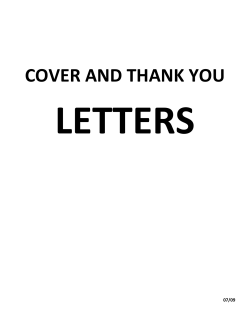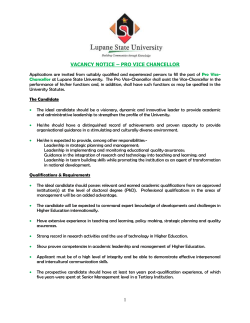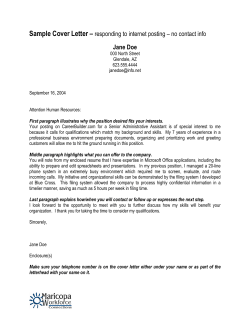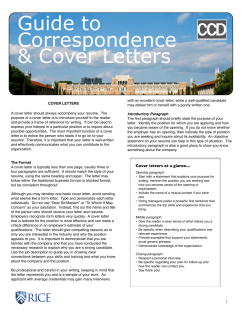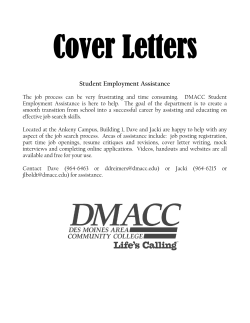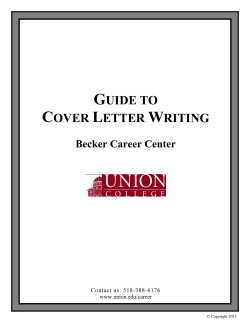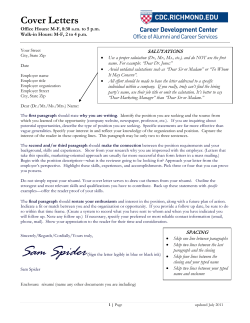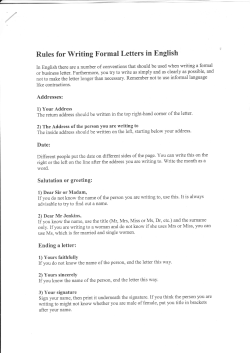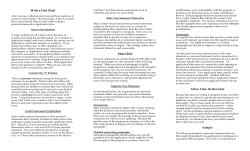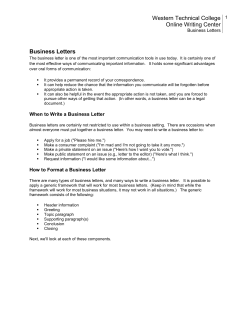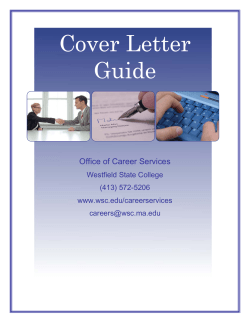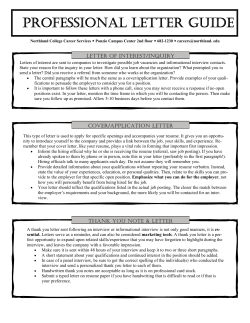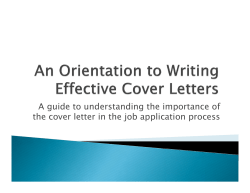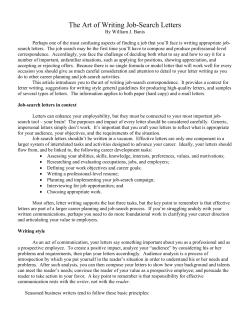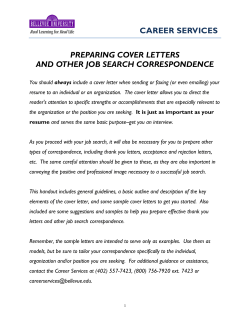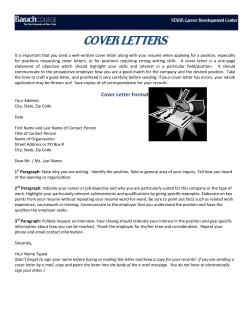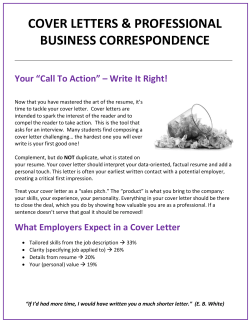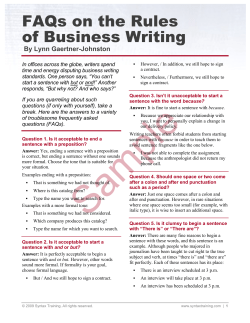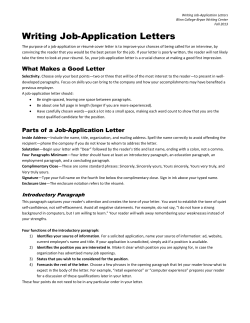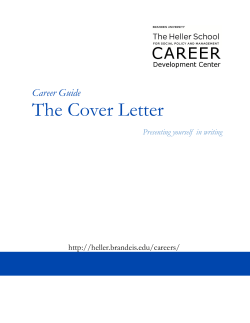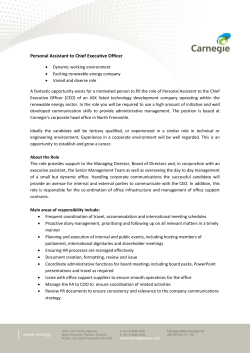
Cover Letters (from Purdue’s OWL)
Cover Letters (from Purdue’s OWL)
What Is a Cover Letter?
A cover letter introduces you and your resume to potential employers. It is the first thing
an employer sees, so it is often the first impression you will make! Take advantage of this
important first impression and prepare the reader for your application, stating why you
are writing, why you are the best person for the job, and when you will contact him or
her.
Cover letters do more than introduce your resume, though. A cover letter's importance
also includes its ability to:
Explain your experiences in a story-like format
Allow you to go in-depth about important experiences/skills and relate them to
job requirements
Show the employer that you are individualizing this job application
Provide a sample of your written communication skills
Quick Content Tips for Cover Letters
There are four basic parts to a cover letter: heading, introduction, argument/body, and
a closing. Here are some tips on what to include in each section:
Heading
Provide your contact information.
Include the date you are writing the letter.
Include the address of the company.
Introduction
Greet the specific person you address the letter to.
State the position you are applying for and where you heard about it.
Name drop if you have a good connection.
State why you believe you are a strong candidate, including 2-3 key qualifications
that you will address in the rest of the letter.
Argument/Body
Tailor cover letter for each job application.
Focus each paragraph on one qualification.
Give specific examples to prove where you got these skills and how you have
used them before.
Tell a story; do not just list your skills.
Refer to your resume; do not repeat it.
Do not use contractions.
Closing
Close with a strong reminder of why you are a good candidate.
Request an interview in some way.
Provide contact information.
Thank them!
Sign your name and print it underneath.
Quick Formatting Tips for Cover Letters
Remember that the basic format of a cover letter follows that of a business letter. As you
design the page, think about the following:
Length
Keep to one page!
Write one paragraph of introduction, one-three paragraphs to prove your skills,
and one paragraph to conclude.
Spacing
Single-space your cover letter.
Leave a space between addresses and dates in the heading.
Leave a space between your heading (contact info) and greeting ("Dear...").
Leave a space between each paragraph.
Leave at least three spaces between your complimentary close ("Sincerely,") and
typed name.
Sign your name in ink between your complimentary close and typed name.
Margins and Alignment
Use standard margins (one-inch margins, usually).
Can use smaller margins (to about 0.7-inch) as long as you are consistent on all
sides.
Center your letter in the middle of the page.
Align all paragraphs to the left of the page. (You can also indent the first line of
each paragraph, but that is not used as often.)
Should I show off my knowledge of the company?
While it is important to use your knowledge of a company to show how you are a good
match, you do not want to talk just about them. The cover letter should focus on you and
how you meet a company's needs. For example:
American Advertising is committed to providing their clients with superior
customer satisfaction and one-on-one collaboration. My experience shows I can
work with people from different backgrounds and cultures, proving I know how
to put customer satisfaction first…
What do I include in my cover letter's heading?
The heading provides your contact information, the date you are writing, and the address
of the company to which you are applying.
For your contact information, you will want to include the following:
Your name
The address where you can be reached (if you live at college, will it be more
accessible to include the local address or your permanent address?)
Phone number
Fax number (if applicable)
E-mail address
Then, you will skip a line and write the full date (month, day, year). Follow this
by skipping a space and writing the contact information for the person you are
writing to:
Name of the specific person
Title of that person (if available)
Address of the company
The reason you write your phone/fax number and email address is to make it easy
for the company to contact you. You do not need to put this information down for
the company itself.
To whom do I address my letter?
Whenever possible, address your letter to a specific individual, usually the person in
charge of interviewing and hiring. Doing so will give you a greater chance of having your
application packet read and not filed away automatically.
Here are some ideas on how to get the name of a specific person:
Look in the job ad for the contact person.
Call the company for more information.
Research the company's website for the person in charge of the department you
are applying to, or a person in Human Resources.
If you cannot find the name of that person, you may address your letter to a group.
For example:
Dear Hiring Professionals:
Dear Selection Committee:
If you find the name, but cannot decipher the gender of the person, you may greet
that person using their full name instead of their last name. For example:
Dear Ms. Kincaid, (For Amy Kincaid)
Dear Pat Thompson, (For Pat Thompson)
What do I include in my introduction?
The introduction of your cover letter should begin with a greeting to a specific person
("Dear Ms. Kincaid"), followed by a statement of who you are and why you are writing
(why you are a good candidate).
How to catch the attention of the reader.
As the purpose of your introduction is to catch the reader's attention and make you stand
out, you need to be as specific as possible in this section. Here are some tips on how to
start your introduction:
State the university you attend, your major, and what position you are applying
for (if you are a student).
Mention where you heard about the job.
Mention the name of a professor or other contact who has a positive connection
with the company.
Bring up any previous conversations you have had with your reader (i.e., at a job
fair).
Some examples:
As a Purdue University junior in Electrical Engineering, I am applying for the
Engineering Internship advertised on General Electric's website.
Professor Gene Smith speaks highly of Western Electric, and he urged me to write
directly to you.
I have been thinking about our conversation at Purdue's Career Fair on January
26. I agree that a team spirit and strong work ethic are vital for success, and I
believe I can bring these qualities to your company.
How to make a strong claim for yourself.
After gaining the initial attention of the reader, you must make a strong claim about your
candidacy. Clearly state two-three qualifications you have that match the
company/position. These qualifications will then be the focus of your body paragraphs
and arguments. Some examples:
I agree that a team spirit and strong work ethic are vital for success, and I believe
I can bring these qualities to your company.
I believe that my production experience, design skills, and enthusiasm for writing
make me a strong candidate for the Production/Design Internship.
What do I include in my argument/body?
In the body of your cover letter (the argument), you should describe the most important
qualifications to prove why you are the strongest candidate for the job.
You should focus your cover letter's body around the two-three qualifications you
mention in the introduction. In each paragraph you can concentrate on one quality,
seeking to answer the following two questions:
How can I prove I am qualified for this position?
What have I done that sets me apart from other candidates?
How can I prove I am qualified for this position?
You do not want to only mention the skills that you possess; you also have to prove that
you possess them! When writing about your skills, you can think of it as telling a story.
You should describe the experiences of how you received and grew your skills,
mentioning specific places you worked and positions you held. For example:
My communication skills in the workplace have grown because of my internships. When
I was an intern at Newberry & Jones, I wrote memos and letters to customers and
colleagues on a daily basis. This experience taught me to write professionally and to-thepoint.
What have I done that sets me apart from other candidates?
Along with proving your skills, you want to describe how your experience with that skill
is unique. Many people may have communication skills, but have you won an award or
scholarship for technical writing?
Here are some ideas about what might set you apart:
Special projects
Explain course work that gives you a type of professional experience.
Awards
Show that others have recognized the high quality of your work.
Include only those awards that relate to the position you desire.
Accomplishments
Demonstrate how you improved efficiency/productivity at work or school.
Include what you did at school that proves your skills.
Explain how you set a goal and reached it.
What do I include in my closing?
A closing sums up your qualifications and reveals what you plan to do after your readers
have receive your application packet (resume, cover letter, etc.)
Here are our recommended tips for closing your cover letter:
Close with a strong reminder of why you are a good candidate.
Request an interview in some way.
Provide contact information.
Thank them!
Sign your name and print it underneath.
Stating that you will contact the potential employer will cause them to read your
application materials with more interest. Therefore, you have a better chance that your
materials will not be filed away.
© Copyright 2025

